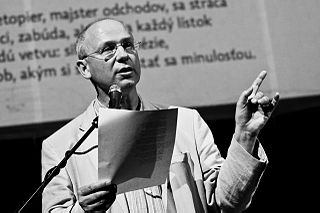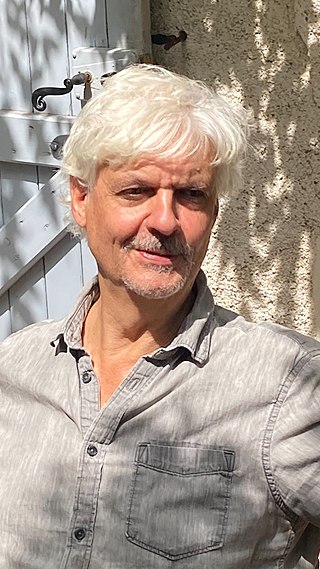
William Carlos Williams was an American poet, writer, and physician closely associated with modernism and imagism.

Ezra Stiles was an American educator, academic, Congregationalist minister, theologian, and author. He is noted as the seventh president of Yale College (1778–1795) and one of the founders of Brown University. According to religious historian Timothy L. Hall, Stiles' tenure at Yale distinguishes him as "one of the first great American college presidents."

Susan Howe is an American poet, scholar, essayist, and critic, who has been closely associated with the Language poets, among other poetry movements. Her work is often classified as Postmodern because it expands traditional notions of genre. Many of Howe's books are layered with historical, mythical, and other references, often presented in an unorthodox format. Her work contains lyrical echoes of sound, and yet is not pinned down by a consistent metrical pattern or a conventional poetic rhyme scheme.

Terence Francis Eagleton is an English literary theorist, critic, and public intellectual. He is currently Distinguished Professor of English Literature at Lancaster University.

Cleanth Brooks was an American literary critic and professor. He is best known for his contributions to New Criticism in the mid-20th century and for revolutionizing the teaching of poetry in American higher education. His best-known works, The Well Wrought Urn: Studies in the Structure of Poetry (1947) and Modern Poetry and the Tradition (1939), argue for the centrality of ambiguity and paradox as a way of understanding poetry. With his writing, Brooks helped to formulate formalist criticism, emphasizing "the interior life of a poem" and codifying the principles of close reading.

Joseph Hillis Miller Jr. was an American literary critic and scholar who advanced theories of literary deconstruction. He was part of the Yale School along with scholars including Paul de Man, Jacques Derrida, and Geoffrey Hartman, who advocated deconstruction as an analytical means by which the relationship between literary text and the associated meaning could be analyzed. Through his career, Miller was associated with the Johns Hopkins University, Yale University, and University of California, Irvine, and wrote over 50 books studying a wide range of American and British literature using principles of deconstruction.

Sir Geoffrey William Hill, FRSL was an English poet, professor emeritus of English literature and religion, and former co-director of the Editorial Institute, at Boston University. Hill has been considered to be among the most distinguished poets of his generation and was called the "greatest living poet in the English language." From 2010 to 2015 he held the position of Professor of Poetry in the University of Oxford. Following his receiving the Truman Capote Award for Literary Criticism in 2009 for his Collected Critical Writings, and the publication of Broken Hierarchies , Hill is recognised as one of the principal contributors to poetry and criticism in the 20th and 21st centuries.

Thomas Ernest Hulme was an English critic and poet who, through his writings on art, literature and politics, had a notable influence upon modernism. He was an aesthetic philosopher and the 'father of imagism'.

Sir John Frank Kermode, FBA was a British literary critic best known for his 1967 work The Sense of an Ending: Studies in the Theory of Fiction and for his extensive book-reviewing and editing.
Robert V. Young, Jr. is a professor of Renaissance Literature and Literary Criticism in the English Department of North Carolina State University, co-founder and co-editor of the John Donne Journal, and author of multiple books and articles primarily related to the study of literature. He became the editor of the conservative quarterly Modern Age in 2007.
Traugott Lawler is a medievalist scholar, expert on William Langland, and an emeritus professor of English at Yale University, where he served as master of Ezra Stiles College and also as a lecturer in religion and literature.
John Lennard is Professor of British and American Literature at the University of the West Indies (UWI), Mona, Jamaica, and a freelance academic writer and film music composer. Since 2009 he has been an independent scholar in Cambridge and a bye-Fellow of Christ's College, Cambridge.

W. N. Herbert, also known as Bill Herbert is a poet from Dundee, Scotland. He writes in both English and Scots. He and Richard Price founded the poetry magazine Gairfish. He currently teaches at Newcastle University.

Stephen Romer, FRSL is an English poet, academic and literary critic.

Norman Holmes Pearson was an American academic at Yale University, and a prominent counterintelligence agent during World War II. As a specialist on American literature and department chairman at Yale University he was active in establishing American Studies as an academic discipline.

Harold Bloom was an American literary critic and the Sterling Professor of Humanities at Yale University. In 2017, Bloom was called "probably the most famous literary critic in the English-speaking world." After publishing his first book in 1959, Bloom wrote more than 50 books, including over 40 books of literary criticism, several books discussing religion, and one novel. He edited hundreds of anthologies concerning numerous literary and philosophical figures for the Chelsea House publishing firm. Bloom's books have been translated into more than 40 languages. He was elected to the American Philosophical Society in 1995.
Caleb Powell Haun Saussy is University Professor at the University of Chicago.
Robert Cairns Craig is a Scottish literary scholar, specialising in Scottish and modernist literature. He has been Glucksman Professor of Irish and Scottish Studies at the University of Aberdeen since 2005. Before that, he taught at the University of Edinburgh, serving as head of the English literature department from 1997 to 2003. He was elected a fellow of the British Academy in 2005.
Peter Thomas Barry FEA, FLSW is a British writer and academic.

Ethelbert Talbot Donaldson was a scholar of medieval English literature, known for his 1966 translation of Beowulf and his writings on Chaucer's poetry.













